Dejan Lukovic (born 03.08.1994) earned his bachelor’s degree in German Studies at the Leopold-Franzens-Universität Innsbruck and is enrolled in the two master programs “Media” and “Comparative Literary Studies”. He is currently working on his master thesis about human-machine-interactions in speedrunning.
Gotta Go Fast – Human-Machine-Interaction in Speedrunning
Lecture, Sunday, 20th October, 17:00 – 17:30
This paper focuses on the question of how one can make sense of the human-machine-interaction in speedrunning, especially in speedruns of virtual reality games. For this purpose, speedrunning is conceptualized as the act of completing a goal (most often a game) as fast as possible under certain rules as defined by the corresponding community of speedrunners.
In this endeavour to reach the fastest possible time speedrunners approach games differently to so called “casual runs” (normal playthroughs) and this fact thus changes how the runners and the machines are interacting with each other. Especially these changes in how runners act together with the machine are the focus of this paper, exemplified by the analysis of how these changes occur and how they can be described.
The hypothesis of this paper then is, that there are three distinct kinds of human-machine-interactions which occur during speedrunning and which depend on each other to constitute the phenomenon known as speedrunning. These findings will be accompanied by examples and analysis of speedruns – especially of virtual reality games – and the practices which runners perform within each speedrunning-community. This approach will allow for a better understanding of what happens during speedrunning, what it means to do so and how humans and machines interact while doing so.

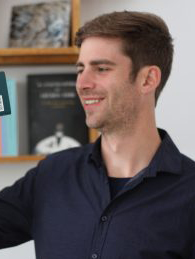 Mag. Matthias Treitler ist Masterstudent der Kartographie & Geoinformation an der Universität Wien. Er schloss das Lehramtsstudium für Geographie & Wirtschaftskunde sowie Geschichte, Sozialkunde & Politische Bildung an der Universität Wien im Jahr 2018 ab. Im Zuge der Diplomarbeit forscht er an digitalen Bildungsmedien, allen voran der immersiven virtuellen Realität, woraus die Diplomarbeit mit dem Titel “Immersive „Virtual Reality“-Lernanwendungen – Entwicklungsgrundlagen und Implementation einer Webapplikation für den Geographie- und Wirtschaftskundeunterricht zum Thema Klima” entstanden ist.
Mag. Matthias Treitler ist Masterstudent der Kartographie & Geoinformation an der Universität Wien. Er schloss das Lehramtsstudium für Geographie & Wirtschaftskunde sowie Geschichte, Sozialkunde & Politische Bildung an der Universität Wien im Jahr 2018 ab. Im Zuge der Diplomarbeit forscht er an digitalen Bildungsmedien, allen voran der immersiven virtuellen Realität, woraus die Diplomarbeit mit dem Titel “Immersive „Virtual Reality“-Lernanwendungen – Entwicklungsgrundlagen und Implementation einer Webapplikation für den Geographie- und Wirtschaftskundeunterricht zum Thema Klima” entstanden ist.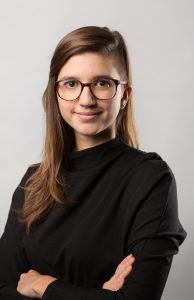 Since 2018 Sarah Wagner is a Fellow at Teach for Austria and works as a teacher at a new secondary school in the 2nd district of Vienna, where she is currently teaching German, art and sport.
Since 2018 Sarah Wagner is a Fellow at Teach for Austria and works as a teacher at a new secondary school in the 2nd district of Vienna, where she is currently teaching German, art and sport. Christoph Kaindel ist Medienvermittler, Medienbastler, Grafiker und Cartoonist. In der Redaktion von mediamanual ist er für die Koordination der Aktionswoche “Woche der Medienkompetenz” zuständig. Er lebt in Gablitz bei Wien
Christoph Kaindel ist Medienvermittler, Medienbastler, Grafiker und Cartoonist. In der Redaktion von mediamanual ist er für die Koordination der Aktionswoche “Woche der Medienkompetenz” zuständig. Er lebt in Gablitz bei Wien After finishing his Bachelor in Computer Science and Engineering, Simon Bernard jumped right into the world of indie game development. Before that, Simon was leading multiple software development projects for industrial companies. While currently still working on his Master degree in Game Studies and Engineering, the former music engineer started his own indie game company within the first year of the program. His bachelor thesis ‘Digital Interactive Quiz Portal for Museums with Focus on Gamification’ was his first step towards learning game design.
After finishing his Bachelor in Computer Science and Engineering, Simon Bernard jumped right into the world of indie game development. Before that, Simon was leading multiple software development projects for industrial companies. While currently still working on his Master degree in Game Studies and Engineering, the former music engineer started his own indie game company within the first year of the program. His bachelor thesis ‘Digital Interactive Quiz Portal for Museums with Focus on Gamification’ was his first step towards learning game design.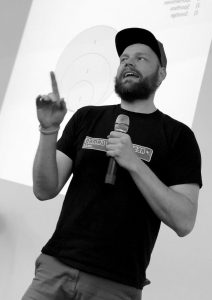 Rudolf Inderst studierte Politikwissenschaften, Neuere und Neuste Geschichte sowie Amerikanische Kulturgeschichte in München und Kopenhagen. Der an der LMU München und Universität Passau doppelt promovierte Spieleforscher leitet das Ressort Digitale Spiele bei dem Online-Kulturjournal nahaufnahmen.ch. Auf Twitter, Xbox Live und PlayStation Network findet man ihn als @BenFlavor.
Rudolf Inderst studierte Politikwissenschaften, Neuere und Neuste Geschichte sowie Amerikanische Kulturgeschichte in München und Kopenhagen. Der an der LMU München und Universität Passau doppelt promovierte Spieleforscher leitet das Ressort Digitale Spiele bei dem Online-Kulturjournal nahaufnahmen.ch. Auf Twitter, Xbox Live und PlayStation Network findet man ihn als @BenFlavor. Pascal Wagner hat einen M.A. in kultureller und kognitiver Linguistik sowie einen B.A. in Anglistik und Rechtwissenschaften an der Ludwig-Maximilians-Universität München absolviert. Seine Masterarbeit schrieb er über Lokalisation, Benennungsmotive und kulturelle Fixierung von Fantasieworten bei der Übersetzung digitaler Spiele aus dem Japanischen ins Englische und Deutsche. Er ist Gründer des Game Studies- und Wissenschaftskommunikations-Blogs languageatplay.de und Chefredakteur des Printmagazins für Videospielkultur GAIN – Games Inside. Auf Twitter ist er als @indieflock zu finden.
Pascal Wagner hat einen M.A. in kultureller und kognitiver Linguistik sowie einen B.A. in Anglistik und Rechtwissenschaften an der Ludwig-Maximilians-Universität München absolviert. Seine Masterarbeit schrieb er über Lokalisation, Benennungsmotive und kulturelle Fixierung von Fantasieworten bei der Übersetzung digitaler Spiele aus dem Japanischen ins Englische und Deutsche. Er ist Gründer des Game Studies- und Wissenschaftskommunikations-Blogs languageatplay.de und Chefredakteur des Printmagazins für Videospielkultur GAIN – Games Inside. Auf Twitter ist er als @indieflock zu finden.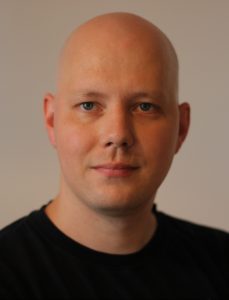 Florian Kelle, former chef, is a master’s student in the Game Studies and Engineering programme at Klagenfurt university. Prior to studying in Klagenfurt, he received a bachelor’s degree in British and American studies from Bielefeld University. His bachelor’s ‘If I Throw a Ball at You, You Could Wait until It Starts Telling a Story – A Ludo-Narratological Approach to Metal Gear Solid 3 and 4’, he concluded his first work on games. Beyond narrative and formalist approaches, he interested procedural literacy and the extra-academic communities of knowledge that arise around videogames. During a seminar he taught on horror in videogames, he has developed an interest in the archaeological implications of exploring games as virtual spaces. Currently, Florian Kelle is working towards his master’s thesis on conducting archaeology in and of videogames.
Florian Kelle, former chef, is a master’s student in the Game Studies and Engineering programme at Klagenfurt university. Prior to studying in Klagenfurt, he received a bachelor’s degree in British and American studies from Bielefeld University. His bachelor’s ‘If I Throw a Ball at You, You Could Wait until It Starts Telling a Story – A Ludo-Narratological Approach to Metal Gear Solid 3 and 4’, he concluded his first work on games. Beyond narrative and formalist approaches, he interested procedural literacy and the extra-academic communities of knowledge that arise around videogames. During a seminar he taught on horror in videogames, he has developed an interest in the archaeological implications of exploring games as virtual spaces. Currently, Florian Kelle is working towards his master’s thesis on conducting archaeology in and of videogames.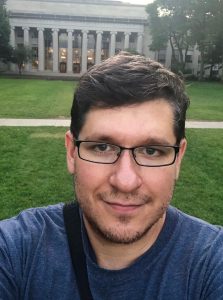 Alexander Pfeiffer is recipient of a Max Kade Fellowship awarded by the Austrian Academy of Science to work at MIT with The Education Arcade. His research focus as a postdoctoral fellow at MIT is on blockchain technologies and their impact on game-based education and learning assessment.
Alexander Pfeiffer is recipient of a Max Kade Fellowship awarded by the Austrian Academy of Science to work at MIT with The Education Arcade. His research focus as a postdoctoral fellow at MIT is on blockchain technologies and their impact on game-based education and learning assessment.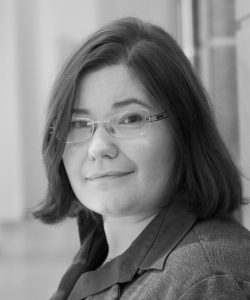 Katharina Bisset is geek, lawyer, translator and all-round creative. Early on in law school she focused on what interested her most: the legal implications of technology. She’s been working in IT-, IP-, Media-, and Data Privacy Law since 2002, whilst never giving up her side passions, whether that’s podcasting, photography, publishing fiction and writing the occasional line of code. With Nerds of Law, equally IT-minded lawyers are working on LegalTech in an effort to bring technology and lawyers together. In some moments of free time she writes on her dissertation about the Open Source Software License GPL. As Associate she advises clients in her areas of expertise, from software licensing contracts to privacy policies and, if necessary, representing them in court.
Katharina Bisset is geek, lawyer, translator and all-round creative. Early on in law school she focused on what interested her most: the legal implications of technology. She’s been working in IT-, IP-, Media-, and Data Privacy Law since 2002, whilst never giving up her side passions, whether that’s podcasting, photography, publishing fiction and writing the occasional line of code. With Nerds of Law, equally IT-minded lawyers are working on LegalTech in an effort to bring technology and lawyers together. In some moments of free time she writes on her dissertation about the Open Source Software License GPL. As Associate she advises clients in her areas of expertise, from software licensing contracts to privacy policies and, if necessary, representing them in court.